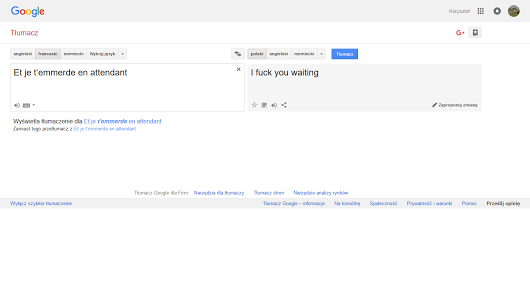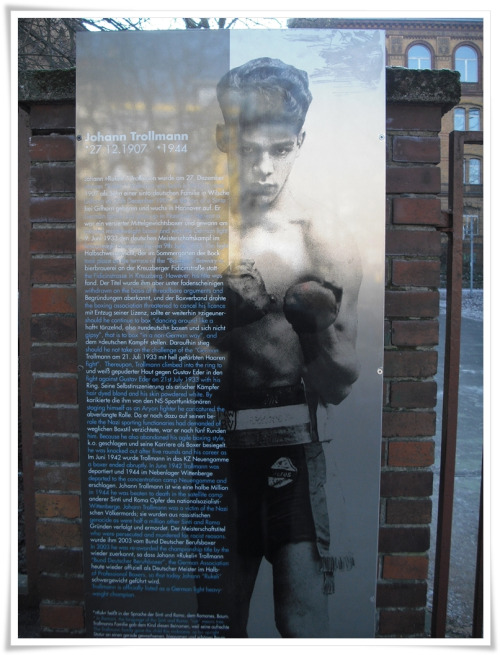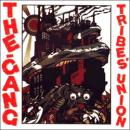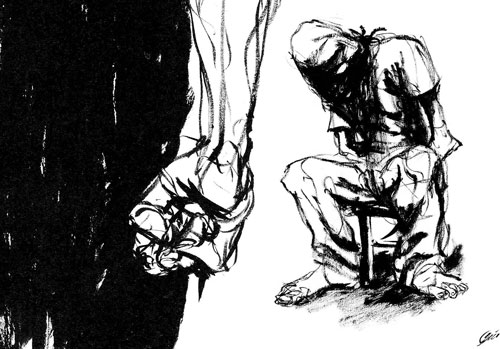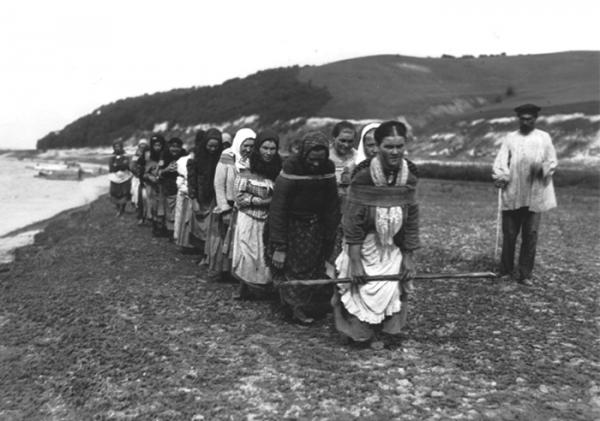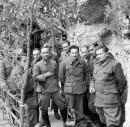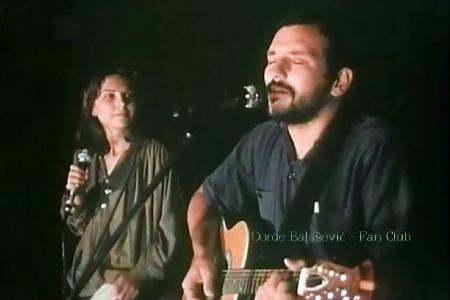Ballata degli impiccati
La versione inglese di Dennis Criteser [2014]

Dal blog Fabrizio De André in English
"La ballata degli impiccati" is closely related to a 1462 poem, "Ballade des pendus" by François Villon, written in prison while waiting for his execution. Whereas Villon asks for pity for the condemned, the lyrics of De Andrè and Bentivoglio express rancor for those who judged, for those who buried, even for those who remembered, all of whom will inevitably also meet their ends.
Tutti morimmo a stento, released in 1968, was one of the first concept albums in Italy. In De Andrè's own words, the album "speaks of death, not of bubble gum death with little bones, but of psychological death, moral death, mental death, that a normal person can encounter during his lifetime." After the success of Volume I, De André was provided for this next album a cutting edge recording studio complete with an 80-member orchestra, directed by Gian Piero Reverberi, and a... (continuer)
"La ballata degli impiccati" is closely related to a 1462 poem, "Ballade des pendus" by François Villon, written in prison while waiting for his execution. Whereas Villon asks for pity for the condemned, the lyrics of De Andrè and Bentivoglio express rancor for those who judged, for those who buried, even for those who remembered, all of whom will inevitably also meet their ends.
Tutti morimmo a stento, released in 1968, was one of the first concept albums in Italy. In De Andrè's own words, the album "speaks of death, not of bubble gum death with little bones, but of psychological death, moral death, mental death, that a normal person can encounter during his lifetime." After the success of Volume I, De André was provided for this next album a cutting edge recording studio complete with an 80-member orchestra, directed by Gian Piero Reverberi, and a... (continuer)
BALLAD OF THE HANGED MEN
(continuer)
(continuer)
envoyé par Riccardo Venturi 9/2/2016 - 21:49
Fabrizio De André: Amico fragile
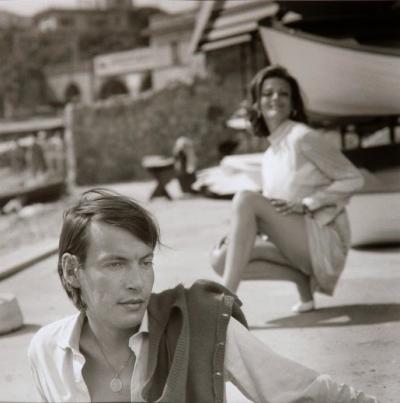
Dal blog Fabrizio De André in English
"De André wrote "Amico fragile" in a drunken rage after attending a party of rich Italians vacationing on Sardinia. They were only interested in having him play guitar and sing his songs, whereas De André wanted to engage people in discussions about events going on in Italy. He became ever more frustrated and inebriated with the shallowness of the evening, returning home to stay up all night and produce this "stream of semi-consciousness" rant. The song was a staple in his live shows and was one of De André's favorites." - Dennis Criteser
"De André wrote "Amico fragile" in a drunken rage after attending a party of rich Italians vacationing on Sardinia. They were only interested in having him play guitar and sing his songs, whereas De André wanted to engage people in discussions about events going on in Italy. He became ever more frustrated and inebriated with the shallowness of the evening, returning home to stay up all night and produce this "stream of semi-consciousness" rant. The song was a staple in his live shows and was one of De André's favorites." - Dennis Criteser
FRAGILE FRIEND
(continuer)
(continuer)
envoyé par Riccardo Venturi 9/2/2016 - 20:47
Andrea
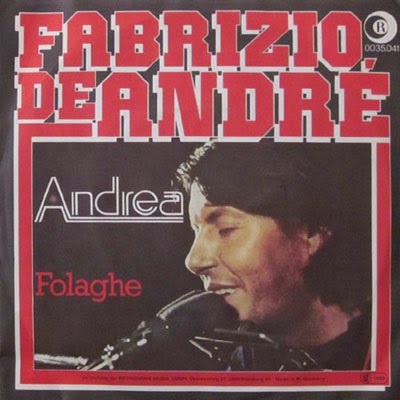
Dal blog Fabrizio De André in English
"Andrea" is both an anti-war song and a statement of solidarity with and acceptance of gays, as the song is about the love between two men (Andrea is a man's name in Italian). The setting for the song is World War I, which can be deduced because intense battles occurred on the ground in the mountains of Trent during WWI, whereas in WWII Trent suffered bombing from the air by the Germans toward the end of the war.
Rimini grew out of De André's disappointments with the political events of the previous couple of years. In close collaboration with Massimo Bubola, a young 24-year-old who had just released his first album, De André explored several social and political themes, including abortion, homosexuality, and how the petty bourgeois attempted to move into the ranks of the powerful and rise above the political and social turmoil of the times. The music... (continuer)
"Andrea" is both an anti-war song and a statement of solidarity with and acceptance of gays, as the song is about the love between two men (Andrea is a man's name in Italian). The setting for the song is World War I, which can be deduced because intense battles occurred on the ground in the mountains of Trent during WWI, whereas in WWII Trent suffered bombing from the air by the Germans toward the end of the war.
Rimini grew out of De André's disappointments with the political events of the previous couple of years. In close collaboration with Massimo Bubola, a young 24-year-old who had just released his first album, De André explored several social and political themes, including abortion, homosexuality, and how the petty bourgeois attempted to move into the ranks of the powerful and rise above the political and social turmoil of the times. The music... (continuer)
ANDREA
(continuer)
(continuer)
envoyé par Riccardo Venturi 9/2/2016 - 20:36
Canzone per l’estate
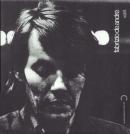
Dal blog Fabrizio De André in English
"The music of "Canzone per l'estate" is entirely De Gregori's, while the lyrics were co-written. De André described the song as somewhat autobiographical, describing the tension between the bourgeois life he grew up in and lived much of his life in, and his attraction to anarchism and to society's outcasts who seemed more genuine and alive than the upper classes. Indeed the song describes well the soul-sapping nature of a comfortable, prosperous life that takes one away from vitality and even political engagement ("your eyes closed to the people")." - Dennis Criteser
SONG FOR THE SUMMER
(continuer)
(continuer)
envoyé par Riccardo Venturi 9/2/2016 - 20:25
La cattiva strada

Dal blog Fabrizio De André in English
"Literally, "cattiva strada" means "bad road." But in a moral sense, if you're straying down the wrong path, going down a slippery slope or leading someone astray, you're on a "cattiva strada" and more than a paving crew will be needed. Author and De André expert Cesare Romana observed the following about "La cattiva strada": "The song is among the most illustrative of the philosophy of a great moralist disguised as an 'immoralist.' The bad road represents a pirate ethic, and also the free port where the powers-that-be don't come. Thus it comes to be defined as bad, yet holding these mainstream powers at a distance endows a force most subversive and revolutionary that can be placed at our disposition: love. The fact is that De André never moved far from the bad road. He continued to think that the humanity, love and dignity of man resided there, and... (continuer)
"Literally, "cattiva strada" means "bad road." But in a moral sense, if you're straying down the wrong path, going down a slippery slope or leading someone astray, you're on a "cattiva strada" and more than a paving crew will be needed. Author and De André expert Cesare Romana observed the following about "La cattiva strada": "The song is among the most illustrative of the philosophy of a great moralist disguised as an 'immoralist.' The bad road represents a pirate ethic, and also the free port where the powers-that-be don't come. Thus it comes to be defined as bad, yet holding these mainstream powers at a distance endows a force most subversive and revolutionary that can be placed at our disposition: love. The fact is that De André never moved far from the bad road. He continued to think that the humanity, love and dignity of man resided there, and... (continuer)
THE ERRANT WAY
(continuer)
(continuer)
envoyé par Riccardo Venturi 9/2/2016 - 18:41
C'era una volta
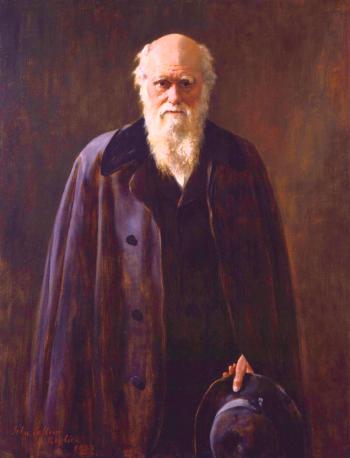
Chanson italienne – C'era una volta – Giorgio Laneve – 1976
Aux débuts des années '70, dans la vague « cantautorale » (chansonnière) italienne qui aura duré, plus ou moins, jusqu'à la fin de la décennie pour ensuite succomber (même musicalement) lors des années de strontium de la décennie suivante, Giorgio Laneve représenta une voix certes menue et polie, mais avec des traits d'originalité (et d'authentique poésie). Ingénieur électronique de formation, Giorgio Laneve commença fort jeune et, pendant une certaine période, il jouit même d'une certaine popularité, sans jouer des coudes (moi-même je me rappelle d'avoir vu une allusion à lui dans le journal de Mickey Mouse, je ne plaisante pas). En 1970, à 24 ans à peine, arriva à l'improviste en second au alors très célèbre « Disque pour l'été » avec Amore dove sei?Amour où es -tu ? , qui reste probablement sa chanson la plus célèbre. Il... (continuer)
Aux débuts des années '70, dans la vague « cantautorale » (chansonnière) italienne qui aura duré, plus ou moins, jusqu'à la fin de la décennie pour ensuite succomber (même musicalement) lors des années de strontium de la décennie suivante, Giorgio Laneve représenta une voix certes menue et polie, mais avec des traits d'originalité (et d'authentique poésie). Ingénieur électronique de formation, Giorgio Laneve commença fort jeune et, pendant une certaine période, il jouit même d'une certaine popularité, sans jouer des coudes (moi-même je me rappelle d'avoir vu une allusion à lui dans le journal de Mickey Mouse, je ne plaisante pas). En 1970, à 24 ans à peine, arriva à l'improviste en second au alors très célèbre « Disque pour l'été » avec Amore dove sei?Amour où es -tu ? , qui reste probablement sa chanson la plus célèbre. Il... (continuer)
IL ÉTAIT UNE FOIS
(continuer)
(continuer)
envoyé par Marco Valdo M.I. 9/2/2016 - 15:23
Canzone per l’estate

In realtà, Fabrizio De André descrisse questa canzone (il cui testo è, sarà bene ricordarlo, stato scritto assieme a Francesco De Gregori) come in un certo qual modo autobiografica. Parla, secondo De André, della tensione tra la vita borghese in cui era cresciuto e aveva vissuto parte della sua vita, e l’attrazione per l’Anarchia e per gli “ultimi” della società, che gli sembravano molto più vivi e genuini delle classi superiori. Fatta salva l’oscurità del testo, caratteristica del resto saliente di quell’album “degregoriano”, si avverte comunque abbastanza bene l’attacco alla vita borghese, confortevole e prospera, che distoglie l’essere umano dalla vitalità e dall’impegno politico (gli “occhi chiusi sulla gente”). Per quel che mi riguarda, l’ho sempre avvertita molto come una canzone sulla dissoluzione della famiglia borghese.
Riccardo Venturi 9/2/2016 - 08:06
Il testamento di Tito

Dal blog Fabrizio De André in English
"Il testamento di Tito" takes us into the Old Testament to the Ten Commandments. Tito, the so-called good thief from the Syriac Infancy Gospel, recounts how he violated each of the commandments (except "Thou shalt not kill"), offering critiques along the way. De André considered this song one of his very best for its hard-hitting social impact." - Dennis Criteser
TITO'S WILL
(continuer)
(continuer)
envoyé par Riccardo Venturi 9/2/2016 - 07:42
Il Pescatore

Dal blog Fabrizio De André in English
"Il pescatore" was released in 1970 as a single. One of De André's most popular songs, it never appeared on a studio album, but can be heard on several live albums." - Dennis Criteser
THE FISHERMAN
(continuer)
(continuer)
envoyé par Riccardo Venturi 9/2/2016 - 07:27
La domenica delle salme
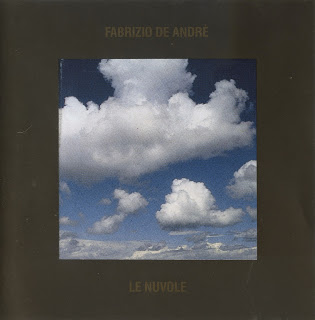
Dal blog Fabrizio De André in English
""La domenica delle salme" is one of De André's most political songs, full of references not easily discernible. The second verse refers to a Milan retirement home resident who was discovered dead under mysterious circumstances. The third verse may refer to a series of murders by a neo-Nazi duo who tagged themselves as Ludwig. The fourth verse refers to the Polish refugees who came to Italy after the fall of the Soviet Union and who worked the streets cleaning car windows (i.e., redoing the makeup of the capitalists heading off to the beach). The fifth verse refers to businessmen looking to profit from the opening of the countries of the former Soviet Union, and the sixth verse refers to the neo-Nazism that subsequently raised its head. The seventh verse may refer to the need for another visible symbol for members of the left and the right to use to... (continuer)
""La domenica delle salme" is one of De André's most political songs, full of references not easily discernible. The second verse refers to a Milan retirement home resident who was discovered dead under mysterious circumstances. The third verse may refer to a series of murders by a neo-Nazi duo who tagged themselves as Ludwig. The fourth verse refers to the Polish refugees who came to Italy after the fall of the Soviet Union and who worked the streets cleaning car windows (i.e., redoing the makeup of the capitalists heading off to the beach). The fifth verse refers to businessmen looking to profit from the opening of the countries of the former Soviet Union, and the sixth verse refers to the neo-Nazism that subsequently raised its head. The seventh verse may refer to the need for another visible symbol for members of the left and the right to use to... (continuer)
PSALM SUNDAY
(continuer)
(continuer)
envoyé par Riccardo Venturi 9/2/2016 - 07:07
Carlo Martello torna [o: ritorna] dalla battaglia di Poitiers; o Carlo Martello
![Carlo Martello torna <i>[o: ritorna]</i> dalla battaglia di Poitiers; <i>o</i> Carlo Martello](img/thumb/c1095_130x140.jpeg?1328357200)
Dal blog Fabrizio De André in English
"This song was released in 1963 as the B side of a 45 with "Il fannullone" as the A-side. The text was written by a friend from childhood, Paolo Villagio, and the music is by De Andrè. The Battle of Poitiers occurred in 732, a battle between the Franks and the Moors in what is now northern France. The song is in the style of popular French pastourelles sung by medieval troubadours about encounters between knights and country girls. In 1965 a complaint was brought against De Andrè and his label Karim for obscene content in the lyrics. The case was settled in De Andrè's favor in 1968. The Italian in this song is an old style, and Riccardo Venturi has done a nice translation into a similarly "olde" style of English." - Dennis Criteser
CHARLES MARTEL RETURNS FROM THE BATTLE OF POITIERS
(continuer)
(continuer)
envoyé par Riccardo Venturi 9/2/2016 - 06:56
Il fannullone
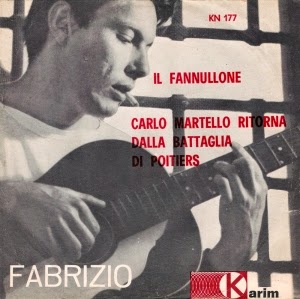
Dal blog Fabrizio De André in English
"Il fannul[l]one" was the A-side of De Andrè's third single on Karim, released in 1963. It was co-written with Paolo Villaggio, a childhood friend. There are several strains in this early song that will surface regularly in later songs: going against the grain of mainstream society, a sense of irony towards so-called respectable folk ("la gente per bene"), and an irreverent and playful attitude. The song no doubt sprang from the anti-conformist lifestyles of the two young authors. Riccardo Venturi called this song "deliciously revolutionary and subversive" and described it as a "hymn to doing nothing," where to do nothing is to live life truly, not allowing a dehumanized corporate complex to take it away from you." - Dennis Criteser
"Il fannul[l]one" was the A-side of De Andrè's third single on Karim, released in 1963. It was co-written with Paolo Villaggio, a childhood friend. There are several strains in this early song that will surface regularly in later songs: going against the grain of mainstream society, a sense of irony towards so-called respectable folk ("la gente per bene"), and an irreverent and playful attitude. The song no doubt sprang from the anti-conformist lifestyles of the two young authors. Riccardo Venturi called this song "deliciously revolutionary and subversive" and described it as a "hymn to doing nothing," where to do nothing is to live life truly, not allowing a dehumanized corporate complex to take it away from you." - Dennis Criteser
THE SLOUCH
(continuer)
(continuer)
envoyé par Riccardo Venturi 9/2/2016 - 06:20
Le formiche

Chanson italienne – Le formiche – Giorgio Laneve – 1976
Aux débuts des années '70, dans la vague « cantautorale » (chansonnière) italienne qui aura duré, plus ou moins, jusqu'à la fin de la décennie pour ensuite succomber (même musicalement) lors des années de strontium de la décennie suivante, Giorgio Laneve représenta une voix certes menue et polie, mais avec des traits d'originalité (et d'authentique poésie). Ingénieur électronique de formation, Giorgio Laneve commença fort jeune et, pendant une certaine période, il jouit même d'une certaine popularité, sans jouer des coudes (moi-même je me rappelle d'avoir vu une allusion à lui dans le journal de Mickey Mouse, je ne plaisante pas). En 1970, à 24 ans à peine, arriva à l'improviste en second au alors très célèbre « Disque pour l'été » avec Amore dove sei?Amour où es -tu ? , qui reste probablement sa chanson la plus célèbre. Il fut même... (continuer)
Aux débuts des années '70, dans la vague « cantautorale » (chansonnière) italienne qui aura duré, plus ou moins, jusqu'à la fin de la décennie pour ensuite succomber (même musicalement) lors des années de strontium de la décennie suivante, Giorgio Laneve représenta une voix certes menue et polie, mais avec des traits d'originalité (et d'authentique poésie). Ingénieur électronique de formation, Giorgio Laneve commença fort jeune et, pendant une certaine période, il jouit même d'une certaine popularité, sans jouer des coudes (moi-même je me rappelle d'avoir vu une allusion à lui dans le journal de Mickey Mouse, je ne plaisante pas). En 1970, à 24 ans à peine, arriva à l'improviste en second au alors très célèbre « Disque pour l'été » avec Amore dove sei?Amour où es -tu ? , qui reste probablement sa chanson la plus célèbre. Il fut même... (continuer)
LES FOURMIS
(continuer)
(continuer)
envoyé par Marco Valdo M.I. 8/2/2016 - 23:29
Timber (Jerry the Mule)

Splendida versione!!! What a Voice!!!
Si tratta di Jewel Brown, classe 1937, la quale - chissà perchè - ebbe una breve carriera e quasi solo come "sidegirl" di Louis Armstrong. Si ritirò dalle scene già nel 1971. Peccato...
E' tornata nel 2012 con un disco per la Dialtone Records, insieme al chitarrista Milton Hopkins, ma senza suscitare grande clamore...
Si tratta di Jewel Brown, classe 1937, la quale - chissà perchè - ebbe una breve carriera e quasi solo come "sidegirl" di Louis Armstrong. Si ritirò dalle scene già nel 1971. Peccato...
E' tornata nel 2012 con un disco per la Dialtone Records, insieme al chitarrista Milton Hopkins, ma senza suscitare grande clamore...
Bernart Bartleby 8/2/2016 - 20:18
La Avenida de los Tilos

Non mi ero accorto che c'era già una canzone, contribuita pure di recente, sulla vicenda dei giovani rugbysti argentini, Ellos nos han separado...
Grazie DQ82!
Grazie DQ82!
Bernart Bartleby 8/2/2016 - 13:03
Sólo le pido a Dios

Esiste su YouTube anche una struggente interpretazione di questa canzone (in lingua originale) da parte del cantautore bolognese Germano Bonaveri.
Andrea Pesce 7/2/2016 - 23:54
Petit Pasqua Noël

PICCOLO PASQUA NATALE
(continuer)
(continuer)
envoyé par Daniel(e) Bellucci . 07.02.2016. Nizza 7/2/2016 - 23:34
A Change Is Gonna Come

Fu rilasciata come bonus track del Greatest Hits del gruppo
A CHANGE IS GONNA COME
(continuer)
(continuer)
7/2/2016 - 21:54
Ho continuato la mia strada

C'ero anch'io alla Mandria e sono uno di quelli che ha suonato e cantato su quel palco, con il gruppo di Siracusa, per "sostituire" i contestati (non tanto loro quanto l'idea degli organizzatori di pagare qualcuno per esibirsi) Angelo Branduardi (quasi sconosciuto al tempo) e Napoli Centrale (appena costituito, Pino Daniele ha collaborato 2 anni dopo).
Non mi era più capitato di cantare questa canzone.
Ieri, a casa di vecchi amici non scout, raccontando dei tempi andati e della route, abbiamo trovato su youtube i remake di Paolo e di un gruppo del Molise https://www.youtube.com/watch?v=reyt1qdlSx4 .
Mi sono commosso e sono riaffiorati tutti i ricordi di quei giorni e di quella serata, nitidi, precisi, intensi.
E' .... bellissimo
Non mi era più capitato di cantare questa canzone.
Ieri, a casa di vecchi amici non scout, raccontando dei tempi andati e della route, abbiamo trovato su youtube i remake di Paolo e di un gruppo del Molise https://www.youtube.com/watch?v=reyt1qdlSx4 .
Mi sono commosso e sono riaffiorati tutti i ricordi di quei giorni e di quella serata, nitidi, precisi, intensi.
E' .... bellissimo
Giampiero Divotti 7/2/2016 - 10:00
Chant de l'Orapu
anonyme

6.II.16
Per farmi un po'...perdonare la confusione che ho combinato con Le transporté, traduco qua il Canto dell'Orapu in una sua versione. Devo fare solo un appunto sulla parola “bricole”, dato che ho visto che se ne parla dell'introduzione. In francese, “bricole” è una parola credo molto antica che in origine indicava i finimenti del cavallo, poi passò a indicare la cinghia del facchino, vale a dire qualcosa di purtroppo molto simile alle corregge dei forzati che vediamo in questo canto. Però il senso normale è quello di cinghia per reggere pesi. Sempre anticamente, voleva dire anche “inganno, imbroglio” ma ha non so quanti significati ancora. “Bricolage” voleva dire, e vuol dire ancora, qualcosa come “fare mille mestieri” o meglio ancora, “sfacchinare”. Il significato di fare lavoretti di casa, il “fai da te”, è abbastanza recente e molto ironico visto che invece indicava tutt'altro che... (continuer)
Per farmi un po'...perdonare la confusione che ho combinato con Le transporté, traduco qua il Canto dell'Orapu in una sua versione. Devo fare solo un appunto sulla parola “bricole”, dato che ho visto che se ne parla dell'introduzione. In francese, “bricole” è una parola credo molto antica che in origine indicava i finimenti del cavallo, poi passò a indicare la cinghia del facchino, vale a dire qualcosa di purtroppo molto simile alle corregge dei forzati che vediamo in questo canto. Però il senso normale è quello di cinghia per reggere pesi. Sempre anticamente, voleva dire anche “inganno, imbroglio” ma ha non so quanti significati ancora. “Bricolage” voleva dire, e vuol dire ancora, qualcosa come “fare mille mestieri” o meglio ancora, “sfacchinare”. Il significato di fare lavoretti di casa, il “fai da te”, è abbastanza recente e molto ironico visto che invece indicava tutt'altro che... (continuer)
CANTO DELL'ORAPU
(continuer)
(continuer)
6/2/2016 - 21:11
De dödsdömda
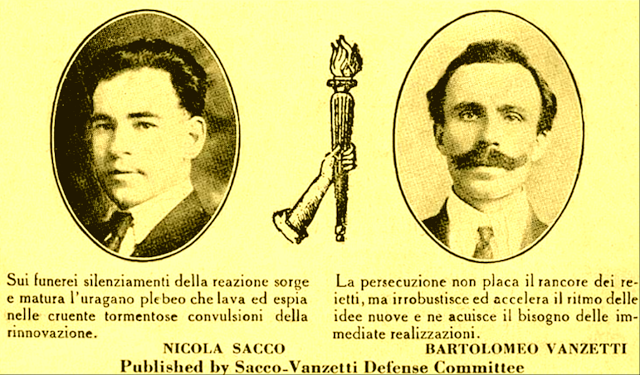
d’après la version italienne de Riccardo Venturi
d’une chanson suédoise - De dödsdömda – Jan Hammarlund – 2008
Un poème de Karin Boye (1927)
mis en musique et chanté par Jan Hammarlund
Karin Boye (1900-1941).
La Grande Karin Boye, autrice de Kallocain, roman distopique qui anticipa 1984 de George Orwell, écrivit cette poésie en 1927 pour Sacco et Vanzetti. Le texte nous a été envoyé directement par l’ami Jan Hammarlund, que l’a mis en musique et chanté. [RV]
Le 22 août 2014 s’est déroulé à l’Istituto De Martino de Sesto Fiorentino, un important événement pendant lequel a été projeté le très rare et survivant film des enterrements de Sacco et de Vanzetti (présenté par l’Université Libertario de Florence). En marge, il m’est revenu à l’esprit que, en février 2008, j’avais traduit en italien cette chanson de Jan Hammarlund tirée d’une poésie de Karin Boye. La traduction nous la fîmes en réalité... (continuer)
d’une chanson suédoise - De dödsdömda – Jan Hammarlund – 2008
Un poème de Karin Boye (1927)
mis en musique et chanté par Jan Hammarlund
Karin Boye (1900-1941).
La Grande Karin Boye, autrice de Kallocain, roman distopique qui anticipa 1984 de George Orwell, écrivit cette poésie en 1927 pour Sacco et Vanzetti. Le texte nous a été envoyé directement par l’ami Jan Hammarlund, que l’a mis en musique et chanté. [RV]
Le 22 août 2014 s’est déroulé à l’Istituto De Martino de Sesto Fiorentino, un important événement pendant lequel a été projeté le très rare et survivant film des enterrements de Sacco et de Vanzetti (présenté par l’Université Libertario de Florence). En marge, il m’est revenu à l’esprit que, en février 2008, j’avais traduit en italien cette chanson de Jan Hammarlund tirée d’une poésie de Karin Boye. La traduction nous la fîmes en réalité... (continuer)
LES CONDAMNÉS À MORT
(continuer)
(continuer)
envoyé par Marco Valdo M.I. 6/2/2016 - 17:38
Azadî bo Kurdistan
“l’Autonomia Democratica è diventata la pratica quotidiana di milioni di donne e di uomini…”
una segnalazione, ciao
Gianni
una segnalazione, ciao
Gianni
Gianni Sartori 6/2/2016 - 16:20
Beat! Beat! Drums!
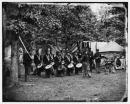
Cara Francesca, mi sa proprio che tu abbia ragione.
E' qui il mio amico Dead End - che conosco molto bene - ad aver preso un grossissimo granchione: questa è proprio un'esortazione alla guerra, e non giustifica nulla il fatto che l'autore fosse nel campo nordista e, quindi, antischiavista...
Siccome succede a volte che certe canzoni vengano inserite senza essere state prima comprese fino in fondo, e però mi dispiace che siano cancellate senza che si dia conto degli interventi che ne hanno rivelato la vera natura, propongo agli admins un percorso "Granchioni" in cui far confluire gli inserimenti sbagliati come questo... Sarebbe anche un bello spaccato sull'evoluzione nel tempo delle CCG/AWS...
Saluti
E' qui il mio amico Dead End - che conosco molto bene - ad aver preso un grossissimo granchione: questa è proprio un'esortazione alla guerra, e non giustifica nulla il fatto che l'autore fosse nel campo nordista e, quindi, antischiavista...
Siccome succede a volte che certe canzoni vengano inserite senza essere state prima comprese fino in fondo, e però mi dispiace che siano cancellate senza che si dia conto degli interventi che ne hanno rivelato la vera natura, propongo agli admins un percorso "Granchioni" in cui far confluire gli inserimenti sbagliati come questo... Sarebbe anche un bello spaccato sull'evoluzione nel tempo delle CCG/AWS...
Saluti
Bernart Bartleby 6/2/2016 - 14:03
Il tessitore damerino
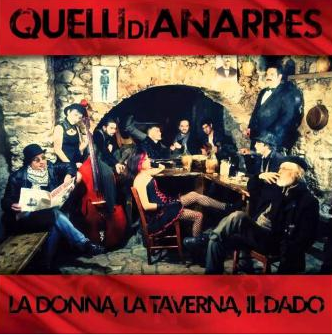
Tu provenivi da una terra assai lontana,
(continuer)
(continuer)
envoyé par dq82 6/2/2016 - 12:57
×
![]()



